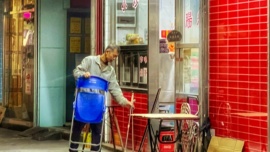Macau Business Editorial |April 2024 | By José Carlos Matias – Director
An uneven recovery pattern has emerged in Macau with ever-widening disparity among the fates of many local small businesses. It’s something this publication has already addressed, and it is now a pressing concern. Shops in residential areas such as the Northern district are struggling, while those in the city’s tourist spots thrive.

The Easter holidays only heightened the trend’s stark contrasts, with hordes of residents eschewing local options and crossing the border to enjoy the mainland’s wide range of shopping and dining options with better value for money. Shop owners and analysts alike point to the Northbound Travel for Macau Vehicles scheme as a significant contributor to this phenomenon, and a similar pattern has been observed in neighbouring Hong Kong.
Representatives from the Industry and Commerce Association of the Macau Northern District and the Macau Catering Industry Association have expressed serious concerns over the impact this trend is having on local small enterprise, citing a wave of business closures with numbers exceeding those during the pandemic in some areas. The predicament is easily understood as the result of an increase in commercial rents plus a decline in custom, particularly during weekends and holiday periods. But who can blame those northbound travellers? And what can be done to tackle the woes of the small, local shops serving residential zones? The first question may be rhetorical, but the second warrants serious thought and a nuanced approach.
The Northbound Travel for Macau Vehicles programme could have been rolled out more gradually, but now there’s no going back, despite the double-edged sword it presents to local residents and businesses. The government appears to be aware of the problem, having launched important initiatives aimed at boosting the attractiveness of residential areas and of consumption there, which include revitalisation projects undertaken in tandem with gaming operators in order to break the monopolisation of tourists’ time by the integrated resorts and major tourist zones. These initiatives may not yield immediate sound results, however. Effective outcomes may only materialise in a future that may be too late for the number of small shops already running on borrowed time.
The Government should provide additional tools, even life jackets, if needed, for those fighting hard to keep heads above choppy water
A pure, supply-and-demand, free-market approach requires local shops to adapt or perish, to adjust and innovate or fade into obsolescence. And while it’s true that market rules will prevail and these businesses must strategize, the fact remains that for a number of them it will be a challenge in some ways tougher than the pandemic. They simply won’t make it unless “shopping small” in Macau is afforded an adequate level of support and protection.
When Ho Iat Seng returns for a Legislative Assembly Q & A later this month, these issues will likely be foremost among the legislators’ and community representatives’ concerns. One hopes the Chief Executive won’t downplay these worries but will instead provide additional tools, even life jackets, if needed, for those fighting to keep heads above choppy water. That sinking feeling is a recipe for disengagement.
























